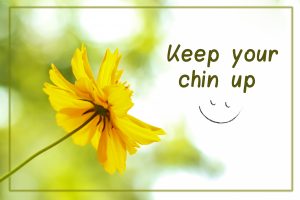
I’ve got a problem. I keep my chin up. Despite the saying, keep your chin up, I’m advised it’s not always a good idea to do that. Why not? Relatability. Why do I do it? I found two reasons that may explain this tendency. Here’s what I discovered…
YouTube Channel
I launched a YouTube channel on which I periodically post videos on change management and the Enneagram. I’ve enlisted the help of coaches to advise me on various aspects of the videos, including my presentation style. Two coaches pointed out that I keep my chin up when addressing the camera. One even suggested that I explore the psychology reason why I was doing that. So I did.
Why Keep Your Chin Up
A search of the psychological importance of keeping your chin up reveals two angles. In short, they are to exude confidence and to lower stress.
This Harvard Crimson article cites a Harvard Business School and Columbia University study which found that keeping your chin up in a power pose results in an…
Increase in testosterone, a hormone traditionally associated with a sense of power, and an equally dramatic decrease in cortisol, a hormone linked to stress.
Posing in displays of power caused advantaged and adaptive psychological, physiological, and behavioral changes.
And these findings suggest that embodiment extends beyond mere thinking and feeling, to physiology and subsequent behavioral choices.
Being prone to stress, it makes sense that I’ve adopted this chin-up behavior to help me lower my cortisol levels. Likely there are other non-verbal cues and feedback that I’ve received over the years which reinforced this behavior.
More reasons to keep your chin up include improved posture and better golf swings. All seems great, right? Well, not always…
Why Not Keep Your Chin Up
My coaches tell me that when I exhibit chin-up behavior on video, I become less relatable. To better relate to the audience, they advise, I need to maintain a “forehead forward, chin down” posture. I have even been advised to keep the camera below eye level to force my chin down and my forehead out. This all feels very uncomfortable to me, but they assure me that with practice the chin-down pose will become natural. I just hope that my lower testosterone and higher cortisol levels don’t cause other problems!
It’s also very distracting for me to do this. If I am concentrating on what I am saying, then my chin wanders back up. It’s like my Adam’s Apple just wants to be seen. But, I don’t want to appear like I’m looking down my nose at my audience. To prevent this, I surround the camera with sticky notes reminding me, Forehead Forward, Chin Down!
Of course, when I explain this dilemma to anyone, I always receive a warm word of encouragement—Don’t Worry, Keep Your Chin Up. Aaaaargh!

Leave a Reply